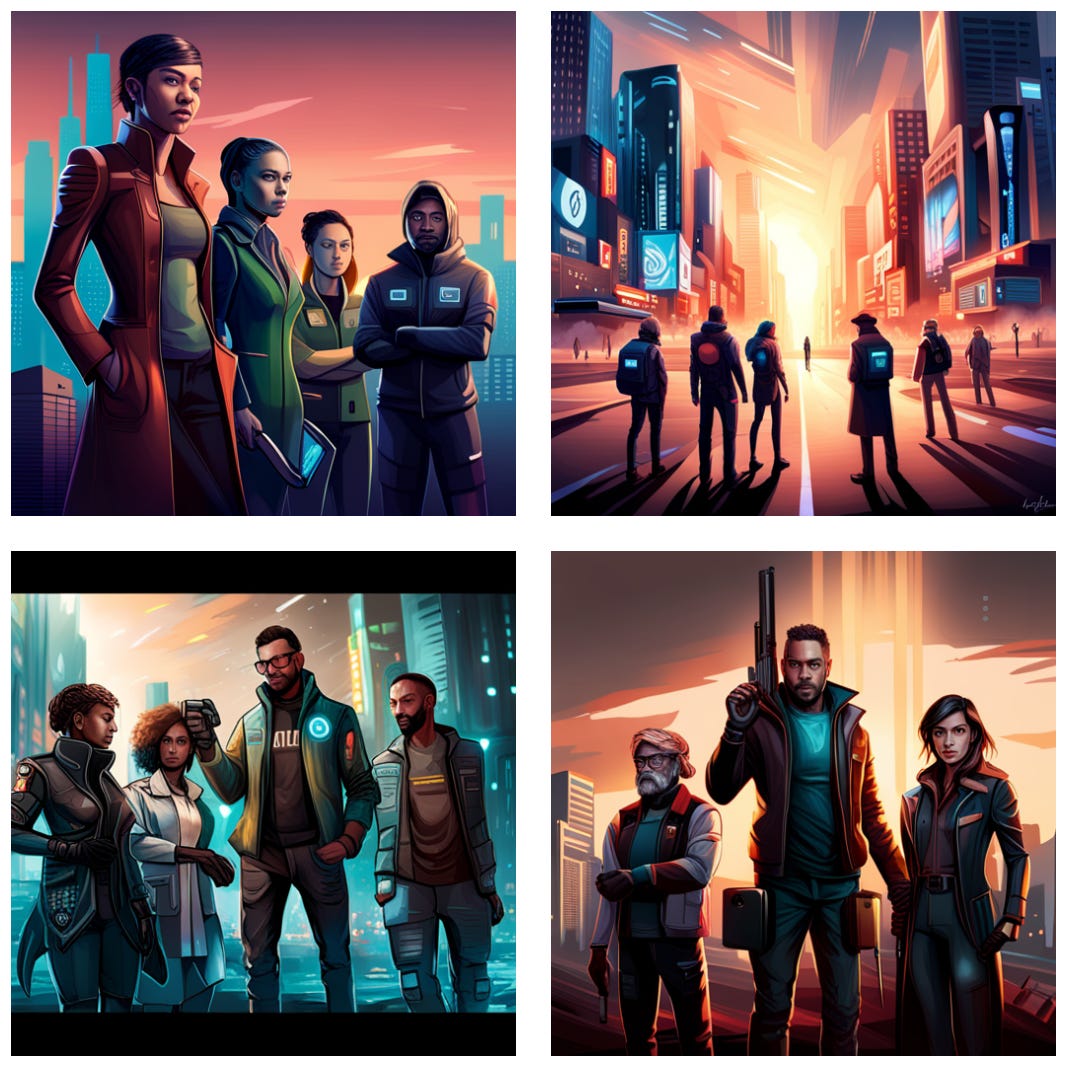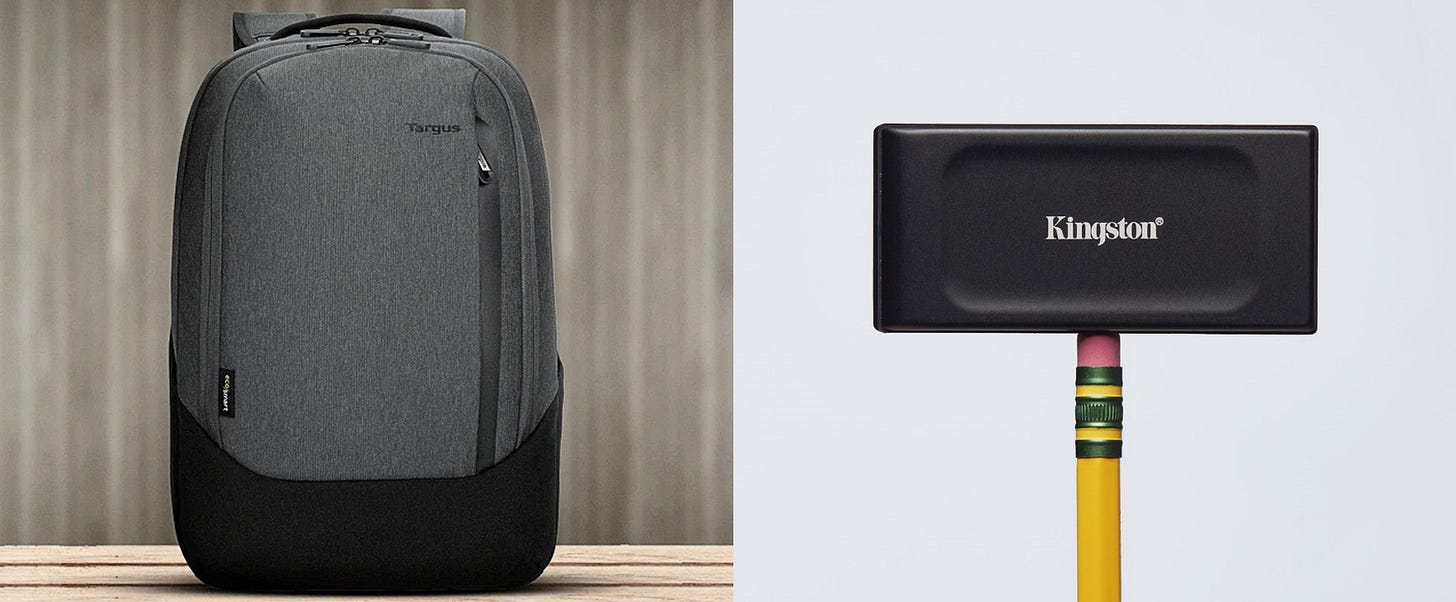The Public as a Laboratory
With AI and other tech, we are the product AND the guinea pigs.
Sree’s newsletter is produced with Zach Peterson (@zachprague). Digimentors Tech Tip from Robert S. Anthony (@newyorkbob). Our sponsorship kit. The images above were generated on Jasper.ai using the following enhanced prompt: “Create a cyberpunk digital painting that depicts a group of people from diverse backgrounds working together to protect the planet from the threat of AI. The style should be dramatic and impactful.”
🗞 @Sree’s #NYTReadalong: Our guest Sunday was legendary Columbia Journalism professor Samuel G. Freedman, whose new book is "INTO THE BRIGHT SUNSHINE: Young Hubert Humphrey and the Fight for Civil Rights.” Watch a recording here. You’ll find three years’ worth of archives at this link (we’ve been reading the paper aloud on social for 8+ years now!). The Readalong is sponsored by Muck Rack. Interested in sponsorship opportunities? Email sree@digimentors.group and neil@digimentors.group.
🎯 Work with us! Our company, Digimentors, does digital and social consulting, as well as virtual/hybrid events production and all kinds of training. See our updated brochure (would love your feedback). Get in touch (no project too big or too small): sree@digimentors.group and neil@digimentors.group. If you’d rather chat, here’s my Calendly.
🤖 I’m now offering workshops about AI, ChatGPT, etc. They’re 20 minutes to 3 hours long, remote or in-person. No audience is too big or too small. If you know of any opportunities to present these (customized for businesses, nonprofits, schools, etc), LMK: sree@digimentors.group. Here’s the brochure to my non-scary guide to AI: http://bit.ly/sreeai2023
***
AI CEOs ARE TRYING A NEW TACTIC. Cigarette CEOs lied for decades about their products’ safety. Oil and gas CEOs still lie about their products’ impact on climate change and more. But within six months of unleashing generative AI upon the world, AI CEOs warned us about the safety of their products:
That was the remarkable May 2023 one-sentence statement from CEOs of AI companies, along with Bill Gates and other notable figures, for the Center for AI Safety. 🤦🏾♂️
So, how will AI affect society? We have no idea, but we are the test cases in a world-bending experiment. Take a step back and think about it for a second. Generative AI was just released for public use, which includes more powerful paid versions, that anyone can use as long as they have an internet connection.
A technology that could end humankind, completely transform work and more, is freely available to anyone with a 4G connection and a data plan. Sure, ChatGPT and its peers were tested and trained and cleaned up and more, but now a few billion people can just use them for free. And, as we use them, they change and adapt to us, molded by our queries, prompts and tendencies. Our relationship with AI is, like any interpersonal relationship, totally dependent on how we behave.
When people talk about “regulating AI,” I immediately nod in agreement. But, when I ruminate on it a bit, things like these pop into my head, and I just don’t really know where to begin:
What can AI do and what can’t it do?
What about well-documented bias in AI training models?
What does AI regulation really mean?
What part of AI do we regulate and how? The tech end? The user side? Data collection?
California is trying to be a first-mover in the space, which makes sense in a lot of ways, via Governor Gavin Newsom’s executive order.
From Politico:
Newsom’s order includes directives to state agencies and departments to perform a joint analysis on the risk AI poses to California’s energy infrastructure; issue guidelines for public sector procurement of generative AI based on White House and National Institute for Standards and Technology-issued guidelines; provide AI training for state government workers; and develop a framework to analyze generative AI’s impact on vulnerable communities.
This is a good start. Public sector contracts can be lucrative for private sector vendors (just ask Elon Musk), and more scrutiny at the beginning of the public procurement process will force a lot of industry players to take safety precautions they would not have otherwise taken. But, this would not apply to something like 99% of the AI-as-a-service industry right from the jump. The industry is exploding, and will likely continue to do so, and my guess is that it will be more B2B than anything else.
It seems like there’s a consensus that AI will be more broadly transformative than social media, but I think the parallels are noteworthy. It’s become ho-hum, but I implore you to jump in the way-back machine to 20 years ago — flip phones, appointment television, etc. No Facebook, Twitter, Instagram, TikTok, YouTube, Snapchat, WhatsApp (which is at least social media-adjacent), and on and on.
Consider the space those platforms have occupied in the last decade. It’s mind-blowing. Social media has changed how the news works, the way Hollywood works, the way politics are practiced, marketing and advertising, travel and tourism, and countless other industries. On the people side of things, where to begin?
We went from landlines to cell phones to texting to selectively broadcasting great swathes of our personal lives for the public to see, comment on, and share. We are still reeling from this communications revolution, and I keep thinking back to the beginning of it all. There was gleeful optimism as we firmly uprooted and dispersed the public square to a bunch of VC-funded startups promising to change the world.
I’m as much of a social media optimist as anyone, but we need to face the fact that not enough people heeded the many prescient warnings we had — from people who knew what they were talking about! — that these technologies had dark underbellies that would be exposed in unthinkable ways when released to the public for free. And, here we are.
We were the test group in what is maybe the largest uncontrolled social experiment ever conducted. “The Facebook” started as a sort of primitive Hot-or-Not college bro site, which is maybe more deplorable than releasing such a tool to the public on a whim and just seeing what happens.
It’s not some easy thing to construct or plan for, of course. There was no way of knowing what Facebook’s explosion would mean for social media and what it would spawn, but it also quite apparent quite quickly that things were going to get very big very fast. On the regulatory side, that was already too late, and I suspect the same may be true for AI.
Almost anyone in the world can use any number of generative AI tools for any number of tasks right know. The people who built these models have no idea what the outputs will be until they happen. This experiment is being conducted on all of us right now, knowingly in some cases, and very much unknowingly in countless others - job hunts, loan applications, and financial markets come to mind right away.
I admit to not having firm answers here. I also know that it all feels very strange and much more existentially important in ways I have trouble describing.
What do you think? Would love to hear your comments.
My previous essays on AI:
My workshop: “Non-scary Guide to AI”
— Sree / Twitter | Instagram | LinkedIn | YouTube | Threads
⚒️ NEWISH: Digimentors Tools Kit: People are always asking me for recommendations for gadgets, gizmos, websites, etc. So my Digimentors team has created a tools kit we will keep updating. Take a look!
DIGIMENTORS TECH TIP: School’s Back and it’s Time to Find Room for All that Gear and Data
By Robert S. Anthony
Each week, veteran tech journalist Bob Anthony shares a tech tip you don’t want to miss. Follow him @newyorkbob.
The end of summer brings the familiar wail of grumbling students: Where did all the time go? How am I going to carry around all this stuff? Where am I going to store all this data? Not surprisingly, tech companies have some suggestions as they gear up for the holiday shopping season.
Portable hard disk drives (HDD) are essential for students who use shared school computers, but even well-made units can fall victim to the knocks and bruises sustained in backpacks or briefcases. A slightly pricier alternative is a portable solid state drive (SSD) since they’re light, more durable than conventional rotating-disk HDDs and they inhale and exhale data much faster.
The new XS1000 external SSD from Kingston Technology is a pocket-size, budget-friendly unit which offers ample capacity (1TB $65; 2TB $110) and can move large files quickly. The one-ounce unit has a USB-C port which supports USB 3.2 Gen 2 speed standards and promises data read/write speeds of up to 1,050 megabytes per second (MB/s).
To put that speed in context, conventional portable HDDs, while offering larger capacities, provide typical data-transfer rates of about 80 to 160MB/s. Thus, an SSD like the Kingston XS1000 can download a large file like a long 4K video far faster than a portable HDD.
Keeping track of school gear can be made easy by attaching tracking devices like Tile’s line of products or Apple’s AirTags, but a new backpack from Targus, a popular maker of laptop and travel bags, has taken tracking technology undercover.
Unlike bags with special pouches for removable tracking devices, the new Targus Cypress Hero Backpack with Find My Locator integrates the tracking electronics into the bag itself, thus making them invisible and hard to remove. The 2.3-pound eco-conscious gray backpack is made from 26 recycled water bottles and has a padded compartment large enough for a laptop with a 15.6-inch screen.
Note however, that the $130 backpack, which uses Low-Energy Bluetooth technology, works with Apple’s Find My app—thus Android users won’t find the tracking feature useful.
Yes, summer’s over but fall tech discounts should be on the way—we hope.
Did we miss anything? Make a mistake? Do you have an idea for anything we’re up to? Let’s collaborate! sree@sree.net and please connect w/ me: Twitter | Instagram | LinkedIn | YouTube / Cameo.








I was explaining AI prompts to my husband this evening. "Oh, it's like what you do with Alexa, when you keep changing the question to get a better answer," he said. And then I explained that, unlike Alexa, generative AI knows the previous prompt and keeps improving its answer based on all the new information you give it. I've been spending a lot of time writing AI prompts lately as I use and experiment with AI tools. I am filled with wonder — and fear — every day as both AI and I get better at this.